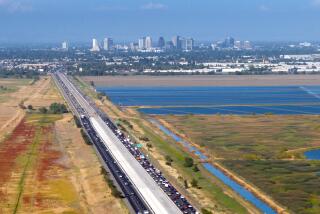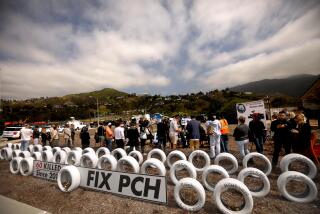Smart Highways--Too Clever to Succeed?
- Share via
Hate the bitter taste of traffic jam in the morning? Tired of your freeway masquerading as an elongated parking lot? By crafting clever networks of software, silicon and sensors embedded in asphalt and automobiles, traffic engineers swear they can create a new generation of “smart highways” that will slice your commuting time in half.
Enthusiasm and media hype for these Intelligent Vehicle/Highway Systems is accelerating. These systems will be designed to relay critical. up-to-the-moment traffic information to drivers and enable them to avoid unnecessary congestion. The General Accounting Office estimated last month that these systems could save Americans $100 billion in lost time.
Europe and Japan have major projects under way. California and the feds plan to spend hundreds of millions of dollars this decade to bring traffic control into the Information Age. Now the capital of congestion, Los Angeles wants to use IV/HS to become the Athens of automobiles, a city where rush hour can truly live up to its name.
CAUTION. REDUCE SPEED. The road to gridlock may be paved with high technology. repairs repairs repairs Unless we’re extremely careful, these smart highways could be too clever by half.
A Bell Labs engineer I know tells a story about how his colleagues were so annoyed by the lunchtime lines at the cafeteria that they actually had one of their statisticians track arrival times. This information was duly posted for everyone to see. The next day, the lines were longer than they had ever been. Why? Because everyone came at the off-peak times. Instead of making the situation better, posting the information had made the situation worse. “The real interesting question,” the engineer said, “is what false information could we have posted to smooth out the crowd?”
That is precisely the question our traffic engineers will face as our highways get smarter. If we really want these systems to work--if we really want them to dramatically improve the flow of traffic--it may well be that traffic controllers will have to deliberately withhold accurate data or broadcast misleading information to commuters. Telling the traffic truth, the whole truth and nothing but the truth could prove a recipe for gridlock.
“From a theoretical point of view, there may be times it may be better for the system to withhold information,” acknowledged Stephen G. Ritchie, an associate professor of civil engineering at UC Irvine and an expert in the design of traffic systems software. “It’s an interesting question in an abstract sense.”
Actually, it’s a very hard-core, practical question. As Ritchie pointed out, a difficult balance has to be struck between the goals of the commuter and the goals of the system. “There’s a user-optimal equilibrium and a system-optimal equilibrium,” he noted. “People want user-optimal equilibria, but from a societal point of view that may not be best. If one provides information to generate system-optimal equilibria, that information may not be optimal for the user. . . . You might not be providing the information that will give the user the best path.”
In other words, the need to withhold or deceive may be an inherent part of such systems. That raises some interesting and provocative public policy questions. Should traffic controllers engage in propaganda--a la Peter Ueberroth’s 1984 (how appropriate!) warnings that the Olympics would generate a traffic nightmare? When, if ever, is it OK not to release information? What would the little old lady from Pasadena think?
“I have not personally encountered any time when we actually intentionally withheld information from the public or distributed erroneous information to the public in order to ease congestion,” said Stephen K. Leung, chief of the traffic systems branch in the Los Angeles office of the California Department of Transportation. “I can see the logic of this, but we certainly haven’t practiced deception.”
On the other hand, Leung acknowledged, “I can see where we might select to whom we target information.” Indeed, if there’s a major closure on a major freeway, his department selectively releases information based on experience on how best to manage the traffic flow. Smart highways, Leung said, will require his group to make more decisions about the release of real-time information: “We have to balance the system.”
“We have to look at the system and set up criteria so that we get the highest possible productivity,” said Roy Bushey, chief of new technology development and automated systems at CalTrans. The issue of withholding and deception “is an interesting thought for debate.”
However, Bushey added: “If you start giving the public bad information, you lose credibility and the whole system collapses.” You end up with people trying to outguess the controllers. Do they really mean a 20 - minute delay? Or are they just saying that to discourage people? But precisely because everyone doesn’t respond the same way to the same information, traffic controllers may be tempted to “advertise” information in a way that gets at least a critical number of people to change their travel paths.
The point is that all this smartness has implications that the experts have yet to publicly discuss. For example, what does optimizing the system really mean, anyway? The folks heading for the suburbs? The people who live in the city? Or some average that costs both of them time? Which neighborhoods will benefit at the commuting expense of others depending upon how the system is optimized?
Let’s not even consider what happens to the traffic when the system crashes (which it will, ask AT&T;) or when software bugs creep in to distort peak travel time data. While I believe that smart highways have tremendous potential that should be aggressively explored, it doesn’t hurt if the policy-makers are at least as intelligent as the highways they propose.






